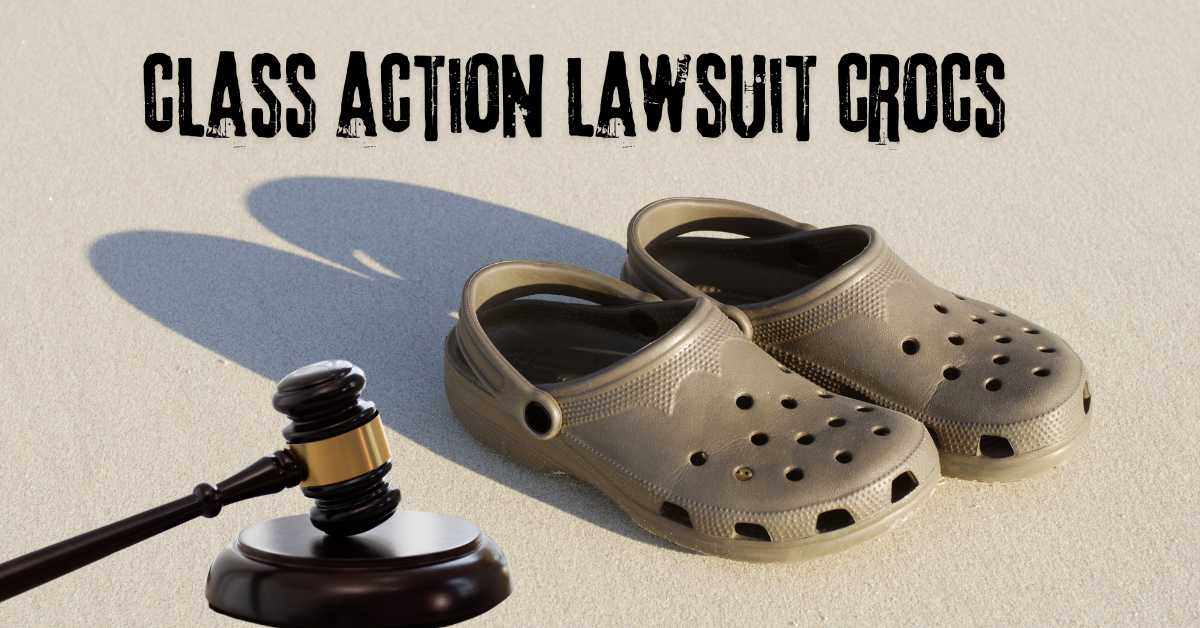In recent times, Class Action Lawsuit Crocs Inc., a globally recognized footwear brand, has found itself at the center of a significant class action lawsuit. This legal action, brought against the company, alleges that Crocs’ popular shoes may shrink when exposed to certain environmental conditions, leading to potential consumer dissatisfaction and safety concerns. The lawsuit has raised questions about product integrity, corporate responsibility, and consumer protection, making it a critical case to watch.
Overview of Crocs Inc. and Its Popularity
A Brief History of Crocs
Class Action Lawsuit Crocs Inc. was founded in 2002 and quickly rose to fame for its unique, comfortable, and versatile footwear. Crocs, originally designed as boating shoes, are made from Croslite, a proprietary foam resin that offers cushioning, durability, and water resistance. Over the years, the brand has expanded its product line, offering a wide range of styles and colors to suit various preferences and occasions.
The Global Appeal of Crocs
Class Action Lawsuit Crocs’ distinctive design and functionality have made them a favorite among consumers worldwide. Their reputation as comfortable, easy-to-wear shoes has led to widespread adoption across various demographics, from children to adults, and from casual wearers to healthcare professionals. However, the recent class action lawsuit has cast a shadow over the brand’s otherwise positive image.
ALSO READ: Spartan Capital Lawsuit: An In-Depth Examination
The Allegations Against Crocs
Claims of Shrinking Shoes
The central issue in the class action lawsuit against Class Action Lawsuit Crocs revolves around the allegation that their shoes can shrink significantly when exposed to heat, sunlight, or water. According to the lawsuit, this shrinking can render the shoes unusable, leading to frustration and potential safety hazards for consumers. The plaintiffs argue that Class Action Lawsuit Crocs failed to disclose this potential defect to customers, thereby violating consumer protection laws.
Misrepresentation and False Advertising
In addition to the shrinking issue, the lawsuit accuses Class Action Lawsuit Crocs of misrepresenting their products’ suitability for outdoor and water-related activities. The plaintiffs claim that Class Action Lawsuit Crocs promoted their shoes as ideal for the beach, pool, and other outdoor environments without adequately warning consumers of the potential for shrinkage. This alleged misrepresentation has formed the basis for claims of false advertising and deceptive business practices.
Case Details: Valentine, et al. v. Crocs Inc.
The case, officially titled Valentine, et al. v. Crocs Inc., Case No. 3:22-cv-07463, was filed in the U.S. District Court for the Northern District of California. The lawsuit seeks to represent all individuals who purchased Class Action Lawsuit Crocs shoes and experienced issues related to shrinking. The plaintiffs are seeking compensation for damages, including the cost of the shoes, potential injuries, and other related expenses.
Legal Grounds for the Class Action Lawsuit
Consumer Protection Laws
Several key consumer protection laws, designed to safeguard buyers from misleading or harmful practices, ground the lawsuit against Class Action Lawsuit Crocs. These laws require companies to provide accurate information about their products and to refrain from making false or deceptive claims. The plaintiffs argue that Crocs violated these laws by failing to disclose the shrinkage issue and by marketing their shoes in a misleading manner.
Breach of Warranty
Another legal basis for the lawsuit is the claim that Class Action Lawsuit Crocs breached both express and implied warranties. The seller makes an express warranty as a specific promise about the product’s quality or performance, while an implied warranty guarantees that the product will meet certain basic standards without being explicitly stated. The plaintiffs contend that by advertising their shoes as suitable for outdoor and water activities, Crocs provided an express warranty that the shoes would perform well in these conditions. The alleged shrinking issue, they argue, constitutes a breach of this warranty.
Negligence and Failure to Warn
The lawsuit also includes claims of negligence and failure to warn. Negligence refers to a company’s failure to exercise reasonable care in the design, manufacture, or marketing of its products. The plaintiffs allege that Crocs was negligent in not adequately testing their shoes for shrinkage and in not warning consumers about the potential risks. The failure to warn claim is based on the argument that Crocs had a duty to inform customers of the shrinkage issue but failed to do so.
Crocs’ Response to the Lawsuit
The Company’s Defense Strategy
In response to the class action lawsuit, Crocs has denied the allegations and indicated that they intend to defend themselves vigorously in court. The company may argue that the shrinking issue is not a widespread problem, that they have adequately tested their products, and that any shrinkage is due to misuse or extreme conditions outside the normal usage of their shoes.
Potential Impact on the Brand
Regardless of the lawsuit’s outcome, the case has the potential to impact Crocs’ reputation and consumer trust. If the allegations are proven true, it could lead to a significant loss of confidence in the brand and potentially affect sales. On the other hand, if Crocs successfully defends against the claims, they may be able to mitigate any negative impact and reinforce their commitment to quality and customer satisfaction.
Broader Implications for the Footwear Industry
Product Integrity and Consumer Trust
The Crocs class action lawsuit highlights the importance of product integrity and consumer trust in the footwear industry. As consumers become more informed and discerning, they expect transparency and honesty from the brands they support. Companies that fail to meet these expectations may face legal challenges and damage to their reputation.
The Role of Class Action Lawsuits in Consumer Protection
Class action lawsuits play a crucial role in holding companies accountable for their products and practices. They provide a mechanism for consumers to seek redress when they believe they have been wronged and this can lead to changes in industry standards and practices. The Crocs lawsuit serves as a reminder to all companies in the footwear industry to prioritize product quality and to communicate openly with their customers.
SEE ALSO: Spartan Capital Securities Lawsuit: A Comprehensive Analysis
Possible Outcomes of the Lawsuit
Settlement vs. Trial
As the lawsuit progresses, there are several possible outcomes. Crocs may choose to settle the case out of court, agreeing to compensate the affected consumers without admitting liability. This approach could help the company avoid the uncertainty and expense of a trial. Alternatively, the case could go to trial, where a judge or jury would determine whether Crocs is liable and, if so, what damages should be awarded.
Impact on Future Product Design and Marketing
The lawsuit could push Crocs and other footwear companies to review their design and marketing practices. They might invest more in product testing, especially under extreme conditions, to ensure their products meet expectations. Additionally, they may adopt more transparent marketing practices, clearly communicating any potential limitations or risks associated with their products.
Lessons Learned from the Crocs Lawsuit
The Importance of Transparency
One of the key takeaways from the Crocs class action lawsuit is the importance of transparency in business. Consumers expect companies to be upfront about their products’ capabilities and limitations. By providing clear, honest information, companies can build trust and avoid potential legal issues.
The Role of Consumer Feedback
The lawsuit also underscores the value of consumer feedback. According to the plaintiffs, Crocs received numerous complaints about the shrinking issue but failed to take adequate action. Companies should view customer complaints as an opportunity to improve their products and address potential problems before they escalate into legal disputes.
Proactive Product Testing
Proactive product testing is another lesson that can be drawn from the Crocs lawsuit. By thoroughly testing products under a variety of conditions, companies can identify potential issues early and make necessary adjustments before the product reaches the market. This approach not only helps prevent legal challenges but also ensures that customers receive high-quality, reliable products.
Conclusion: The Future of Crocs and Consumer Protection
The class action lawsuit against Crocs serves as a cautionary tale for the footwear industry and other consumer product companies. It highlights the importance of product integrity, transparency, and consumer protection in maintaining a positive brand reputation. As the case unfolds, it will be closely watched by legal experts, industry professionals, and consumers alike.
Regardless of the outcome, the lawsuit is likely to have lasting implications for Crocs and the broader industry. Companies may need to reevaluate their product design, testing, and marketing practices to ensure that they meet the evolving expectations of consumers. For Crocs, the lawsuit presents both a challenge and an opportunity to demonstrate their commitment to quality and customer satisfaction.
In today’s informed era, companies prioritizing transparency, integrity, and proactive solutions are better positioned for long-term success. The Crocs lawsuit highlights that trust in consumer products is crucial, and once lost, it’s hard to regain.









